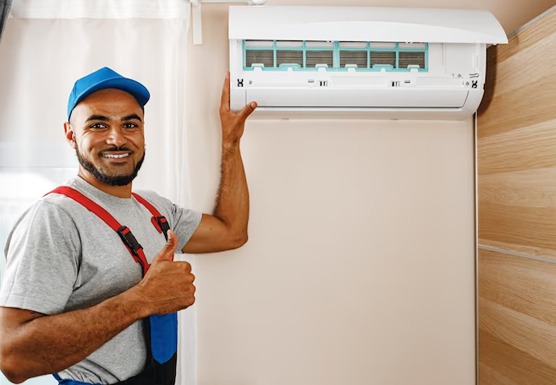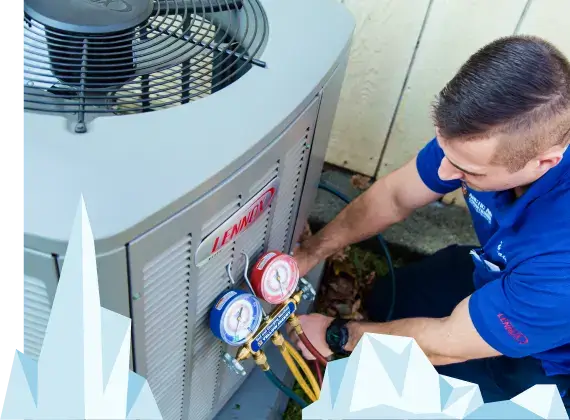Air conditioner Dealing with: Specialist Cooling System Remediation Guarantees Your Home Stays Comfortable During The Most Popular Days
Common A/c Issues
Have you ever felt that sudden rush of warm air simply when you expected a cool breeze? It's frustrating, isn't it? Numerous homeowners face this issue, typically unaware of what hides underneath the surface area of their cooling system. Let's unwind the secret behind some of the most regular concerns that demand timely cooling repair.
Why Will Not My A/c Cool Correctly?
When your air conditioning system blows lukewarm air rather of a refreshing chill, it's a clear sign something's off. A clogged up filter or low refrigerant levels frequently play the villain here. Think of trying to breathe through a scarf on a hot day-- more info that's what a dirty filter does to your system. Ever wondered why your energy bills increase when the cooling drops? That's your air conditioning having a hard time harder to compensate for inefficiencies.
Odd Noises and What They Mean
Clicking, buzzing, or rattling noises aren't simply sounds-- they're sobs for assistance. A loose belt or a stopping working motor might be the offenders. One house owner stated how a persistent grinding noise turned out to be a damaged compressor, conserving them from a total breakdown by acting quickly.
Common Concerns at a Look
| Symptom | Likely Trigger | Quick Fix |
|---|---|---|
| Warm Air | Low refrigerant or unclean filter | Replace filter, check refrigerant levels |
| Water Leakages | Obstructed drain line or frozen coils | Clear drain line, thaw coils |
| Uncommon Sounds | Loose parts or motor problems | Tighten up parts, check motor |
Is Your a/c Cycling On and Off?
Short cycling is more than an inconvenience; it can significantly lower your system's life expectancy. This could signify a large unit or a thermostat glitch. Have you noticed your system switching on and off like a flickering light? Don't ignore it. It's a subtle tip urging you to contact the specialists before it develops into a pricey catastrophe.
- Filthy filters and coils cause air flow problems.
- Thermostat breakdowns cause inconsistent temperatures.
- Electrical problems can stop your a/c from beginning.
Necessary Tools for Air Conditioning Repair
Ever stood in front of a sprawling a/c unit questioning which tool will open the mystery? The right instruments can make all the distinction between a quick repair and a limitless afternoon of frustration. For instance, a digital manifold gauge set isn't just a fancy gizmo; it's the detective's magnifying glass in the world of refrigerant pressure. Its accuracy helps identify leakages or imbalances that a casual glimpse might miss out on.
- Review of Bold City Heating & Air in Jacksonville FL by Gail Stickney: Always professional and extremely thorough with the maintenance of our system! I definitely recommend them to others any chance I get!!
- Review of Bold City Heating & Air in Jacksonville FL by Mitchell Fronczak: Bold City Heating & Air is hands down your go to AC professionals. Josh and Trent made the process so easy and kept us updated along the way when they were moving our outside unit. I will definitely use them again and recommend them to do you HVAC work!
- Review of Bold City Heating & Air in Jacksonville FL by Robert Kruse: I called Bold City AC when my AC went out and they were at my house within a couple of hours. Derek was the service technician and fixed the problem quickly. He also checked out the entire system to ensure everything was good to go. He even cleaned my drain line. All of this at a fair price!! I highly recommend Derek and Bold City AC.
- Review of Bold City Heating & Air in Jacksonville FL by Ryan Clark: Bold City is #1
- Review of Bold City Heating & Air in Jacksonville FL by John Hancock: John arrived and repaired my unit quickly and professionally. Bold City is now my go-to for A/C.
- Review of Bold City Heating & Air in Jacksonville FL by Ashlyn Lupinski: Derek provided great service, was accommodating and explained everything well.
- Review of Bold City Heating & Air in Jacksonville FL by kk jung: We’ve had great experiences with Bold City! Reasonable price too. I recommend this company !!! Robert Graeme was awesome. He was so professional and show up on time, clean up after his job. Thank you so much.
When dealing with stubborn or rusted parts, a quality tubing cutter is worth its weight in gold. It slices through copper pipelines easily, preventing damage that could lead to expensive leakages. Have you ever tried to bend copper tubing by hand just to wind up with kinks? Avoiding this needs specialized flexing tools created to protect the pipeline's stability.
Tools That Professionals Swear By
- Vacuum pump: Necessary for eliminating moisture and air from the system before charging refrigerant, guaranteeing ideal performance.
- Drip detector: An essential for capturing unnoticeable refrigerant leakages that can trigger system ineffectiveness.
- Multimeter: Beyond measuring voltage, it's crucial for detecting electrical faults within the air conditioner's control system.
- Fin comb: A little yet magnificent tool that aligns bent condenser fins, enhancing air flow and performance.
Pro Tips for Using Air Conditioning Repair Work Tools
- Always verify your gauge readings versus manufacturer specs; even skilled techs double-check to avoid costly misdiagnoses.
- When using an air pump, make sure all valves and tubes are airtight; a slight leakage can mess up the evacuation procedure.
- Tidy your fin comb frequently. Dust and grime can trigger it to snag, damaging delicate fins further.

In the heat of summertime, a malfunctioning compressor or stopped up filter can seem like a ticking time bomb. But equipped with the right tools and know-how, the repair work ends up being less of an experience and more of a gratifying puzzle solved. Isn't it curious how a well-calibrated gauge or a simple leak detector can change the whole result?
Step-by-Step Repair Process
Ever observed how your air conditioning unit starts to sputter, barely whispering the cool breeze it when provided? The first move is a thorough medical diagnosis-- because guessing just wastes time and resources. You may begin by examining the thermostat settings, but often the real culprit hides much deeper.

1. Preliminary Evaluation and Diagnostic
Begin by powering off the system to avoid shocks. Open the gain access to panels and aesthetically inspect for charred wires, clogged filters, or ice accumulation. A common oversight is neglecting the condenser coils; dust and dirt here can choke efficiency. Use a multimeter to check electrical elements and validate if the compressor is getting power.
2. Recognizing Refrigerant Issues
Does the unit blow warm air? That's frequently a sign of low refrigerant levels or leaks. Professionals use a manifold gauge set to measure pressure precisely. Keep in mind, overcharging or undercharging the system can cause irreparable damage-- exact measurement is key.
3. Cleaning Up and Element Replacement
In some cases, a simple coil cleaning revives the system. Other times, it requires swapping out capacitors, contactors, or fan motors. Replacing these parts includes careful disassembly and reassembly; avoiding steps can result in additional breakdowns.
4. System Screening and Calibration
Once repairs are made, change the unit back on and observe its habits. Procedure the temperature drop across the evaporator coil-- it should be approximately 15-20 ° F. If not, recalibrate the thermostat or look for air flow obstructions.
Specialist Tips
- Avoid running the compressor without refrigerant-- this stress out the motor rapidly.
- Use a UV color to locate elusive leaks; they're frequently hidden in hard-to-reach locations.
- Never overlook the drain line-- clogs here can cause water damage and system failure.
- Use insulated gloves when handling capacitors; they maintain charge and can deliver a nasty shock.
Protecting Against Sudden Breakdowns
Have you ever questioned why your ac system sputters to a stop right at the peak of summer? The truth is, ignoring routine upkeep typically invites unforeseen failures. Dust, debris, and damaged parts wage a quiet war inside your system. Preventive upkeep is the trump card-- capturing minor concerns before they spiral out of control.
Specialist Tips for Keeping Your A/c in Top Forming
- Tidy or replace filters month-to-month: A clogged filter chokes air flow, requiring the system to work overtime and accelerating wear.
- Examine coil fins: Bent fins limit air passage, just like a traffic congestion in your cooling system. Use a fin comb to align them carefully.
- Check refrigerant levels: Low refrigerant can trigger the compressor to overheat, a precursor to pricey repair work.
- Clear the condensate drain: Clogs here can cause water damage and mold growth, a concealed perpetrator behind remaining smells.
- Examine electrical connections: Loose wiring or rusty terminals typically spark periodic failures, a subtle indication.
When Was the Last Time You Listened to Your air conditioning?
That faint rattling or uncommon hum might appear minor, but it's a precursor to bigger mechanical woes. One summer season, a customer mentioned a soft buzzing noise. A fast inspection exposed a loose fan blade-- simple to fix, yet left ignored, it might have shattered the motor. Minutes like these underscore the worth of regular checks.
Quick List for Seasonal Preparation
| Action | Frequency | Why It Matters |
|---|---|---|
| Filter cleaning/replacement | Every thirty days | Maintains air flow and performance |
| Coil and fin examination | Two times a year | Prevents air flow restrictions |
| Refrigerant level check | Every year | Makes sure proper cooling capability |
| Drain line cleaning | Every 6 months | Avoids water damage and mold |
| Electrical system inspection | Annually | Prevents unexpected shutdowns |
Pro Suggestion: Beyond the Essentials
Did you know that gently oiling the fan motor bearings annually can extend their lifespan? It's an information frequently ignored but crucial. Also, shading your outdoor unit from direct sunlight can decrease the compressor's workload, discreetly boosting durability. Keep in mind, the health of your air conditioner is a reflection of the attention you offer it before it shouts for aid.